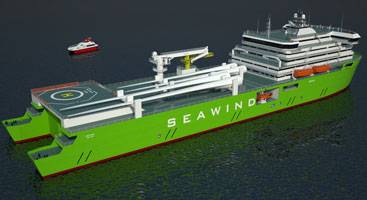Offshore Wind-Farm Maintenance Vessel Concept
Anglo-Dutch company Offshore Ship Designers has launched a new offshore wind farm maintenance vessel concept which will improve uptime of deepwater wind turbines and reduce maintenance costs and carbon emissions while offering a solution to the logistics problem of carrying out simultaneous multiple wind turbine maintenance. The Sea-Wind WMV vessel design is for a mother ship which would remain on station in offshore deep-water wind farms providing a safe haven for multiple numbers of catamaran workboats to carry engineers to service the turbines.
Neil Patterson, managing director of OSD-IMT, Offshore Ship Designers’ UK Company, said, “The Sea-Wind design is a submersible dock ship with a large floodable dock accessible from the stern. It will provide accommodation for wind turbine engineers, service personnel, ships and support crew and can support helicopter operations in addition to its workboat deployment capability. Crew change and supplies will be carried out using a dedicated support vessel with the option to carry out crew changes by using large helicopters normally associated with servicing offshore oil installations.
“With a capability to service up to 45 wind turbines per day in up to 2.5 m significant wave heights, what we are providing is a secure offshore maintenance base from which workboats can be deployed, keeping them and their work crews safely on site in deep water wind farms far from shelter. By remaining on site rather than returning to port between maintenance visits the Sea-Wind WFM vessel design will reduce transit time and energy getting to and from the fields, and will maximise the use of good weather windows. That means savings in cost and energy used for maintenance, reduction of non-operational downtime and increased turbine availability.”
Most of these deep water wind farms will be a long way offshore, some up to 110 km, and each of the thousands of turbines require a routine maintenance program to be carried out in addition to any replacement component maintenance due to wear and tear. The current wind farms closer to shore are serviced by fast catamaran and monohull work boats which go out from the shore in good weather. “The sheer distance and exposed location of offshore Round 3 wind farms makes service from a port difficult, expensive, risky and time wasting,” said Patterson.
“We have taken the best experience of dock ships and their use in military and commercial situations and combined it with our extensive experience in designing offshore support vessels to devise a ship which will be able to remain safely on site and deploy the workboat catamarans in significant wave heights of 2.5 m, while providing a safe haven in bad weather. The Sea-Wind concept has the engineers and working platforms safely on site, and will have an onboard capacity to carry out larger repairs without returning to land.”
In addition to the workboats, the Sea-Wind WMV vessel design also supports Autonomous Rescue and Recovery Craft (ARRC’s) which are certificated as “Places of Safety” and can support marine and helicopter operations remote from the mother ship and provide a safe haven in the event of emergency or rescue situations.
The vessels will be fitted with energy efficient diesel-electric power generation and propulsion systems and will use a number of renewable energy devices to supplement the power generation and support systems, reducing the overall carbon footprint of the vessel.
The largest version of the design will be around 187m overall length and will be fitted with a DP2 dynamic positioning capability, a dry/wet dock, helicopter support facilities, cranes for loading stores from support vessels, and will have accommodation to cater for up to 200 engineers as well as extensive catering and recreational facilities including a cinema, internet room, gymnasium with instructor, sauna, workshops, stores, galley, bakery, cafeteria style mess room, executive mess room, library/quiet room, lounges, coffee corners, doctor and dentists surgeries, first aid room, ships and client offices and briefing rooms. All accommodation will be in single-berth en-suite cabins with a mix of suites, executive client cabins, and standard cabins.
Extensive storage and workshop areas will be provided along with a waste handling plant fitted with recycling capability, waste compacting, water extraction, packaging and wet/dry incineration facilities.
OSD has been working with a catamaran builder/operator to develop a catamaran workboat specifically arranged to work with the Sea-Wind dock ship. They will be fitted with a heave compensated access walkway for accessing the wind turbines.
The dedicated support vessel working with the Sea-Wind WMV mother ship will be an IMT 9552 Wind Farm Maintenance Vessel, which has logistics support capability to carry and transfer cargo fuel, cargo potable water, aviation fuel, dry and refrigerated stores containers on deck and has also single berth accommodation for 25 wind turbine engineers, and is fitted with a crane, heave compensated access walkway and two Daughter Craft Workboats. It can be utilised for maintenance in the wind farm during periods between logistics supply runs.
OSD and its partners are currently in discussion with major wind farm developers and are seeking tenders for the construction of the vessels.














